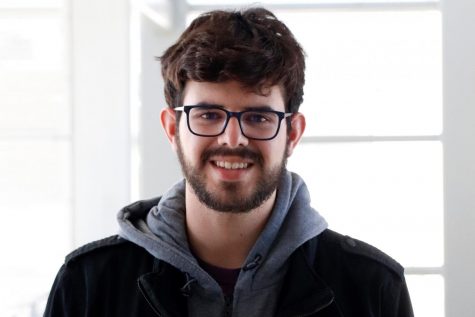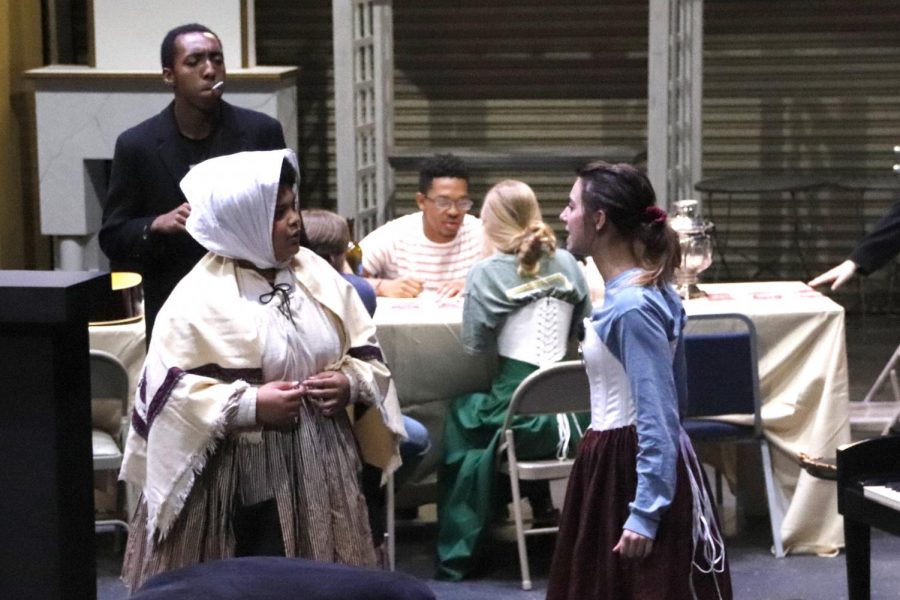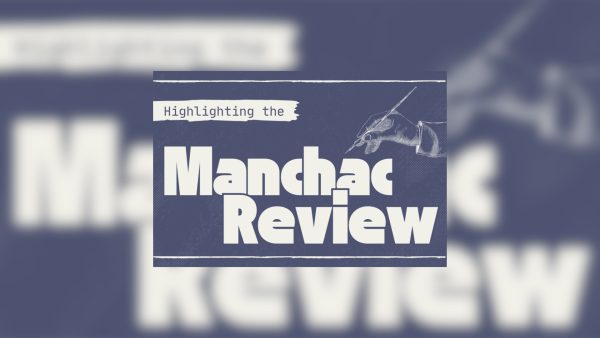Theatre department to perform ‘Three Sisters’ with guest director
Dejuan James and Payton Core rehearsing at the Vonnie Borden on Nov. 8. “I’ve liked growing as an actor. This has been the most challenging role ever in my life,” shared Core. Jacob Lofton/The Lion’s Roar
From Nov. 19-22, the university’s theatre department will be performing Anton Chekov’s play “Three Sisters.”
To help direct the play, the department enlisted the aid of Clarence Gilyard, professor at the University of Nevada, a published author and an experienced actor and director. Gilyard shared what the audience can look forward to about the play.
“It’s supposed to be a comedy about three sisters and a sister-in-law who are stuck geographically in their life,” explained Gilyard. “They want to live someplace else, but they’re stuck where they are. They’re trying to figure out the best they can, with the resources that they have at this time in the world. It’s the turn of the 20th century, how to get to where they want to go. That’s literal, but it’s also metaphorical. It’s a theme. It’s like a life theme.”
The cast expressed how much they were able to learn due to Gilyard’s insight into advanced theatre. Jaquline Andry, an undeclared sophomore, explained how Gilyard has helped the cast grow as actors.
“Clarence really does love working with us,” said Andry. “He’s the director, and it’s so interesting to see how he thinks. You’ll be doing a scene, and you’ll be doing something and he’ll stop you and he won’t be mean about it. He’ll say ‘Hold up, hold up one second. What you just did there, why did you do that?’ And you’ll be like ‘I don’t know, I just did it,’ and he’ll be like ‘But remember in this act when you state this line? So you wouldn’t have done that.’ The smallest little details, but you’re like ‘He’s right, I would not do this.’ It’s so interesting to see how his mind works.”
Gilyard is using his time at the university as a chance for research to help him write a textbook. Gilyard noted that he and the cast have had to overcome a few challenges to put together the play.
“There are no difficulties,” shared Gilyard. “There are challenges. I choose not to use that word because you can say my life is difficult, or you can say my life is a challenge, half full, half empty sort of thing. There are different challenges with working in a university setting versus working in the professional world, because I direct professionally also. One of the things is that we have only a certain amount of time to do something that is practically impossible to do.”
Gilyard explained the differences between Russian and American plays.
“A great epic play, in the Russian tradition, they would be working on it for a year,” said Gilyard. “In regional theatre in the United States, you get three and a half weeks. I came and we’ve been working on it for six weeks. If you read the play, you’ll say ‘How could you possibly put this together in six weeks?’ And plus these are very, very talented but very young, raw actors and I’m talking about professional people trying to do it.”
Another guest of the university, Richard Bugg, professor of theatre arts at the University of Southern Utah, will also play a role in the play. Bugg shared what he had learned from this experience will help him in the future.
“You always learn,” expressed Bugg. “I’m able to draw on a lot of my life experiences for this character even though he’s really younger than me. I was kind of surprised he cast me in this role. I kind of thought I would be playing the older character but I’ve certainly experienced a lot of the things he’s experienced and so it’s a reminder to me to connect with my own experience and to give it the nuance that I think can only come from having experiences.”
Gilyard emphasized why he enjoys the play and what sets “Three Sisters” apart from other plays from its era.
“I chose this play because of the female parts, particularly, the four-five compelling female parts,” shared Gilyard. “There are men
“I chose this play because of the female parts, particularly, the four-five compelling female parts. There are men parts and they are compelling but the fact that these particular female parts are close to their age, their chronological age, you would think that would give them some kind of easier access. I feel drawn to working in what I call ‘protest theatre’ and this playwright I think arguably can be considered a creator of early protest theatre. You can say he would be a feminist, at the turn of the century. I think he supported women and what they think about themselves, what they want.”
The Vonnie Borden Theatre box office will be open from 6:30-7:30 for each performance. University students can view the play free with their university ID and general admission is $20.
Your donation will support The Lion's Roar student journalists at Southeastern Louisiana University.
In addition, your contribution will allow us to cover our annual website hosting costs.
No gift is too small.

Jacob Lofton is a music education major from Prairieville. He has been a staff reporter with The Lion’s Roar since the Fall of 2019 and spends his spare...





